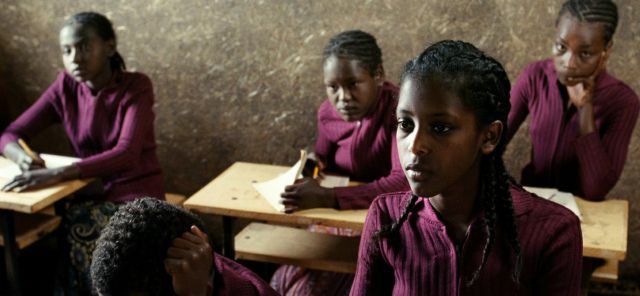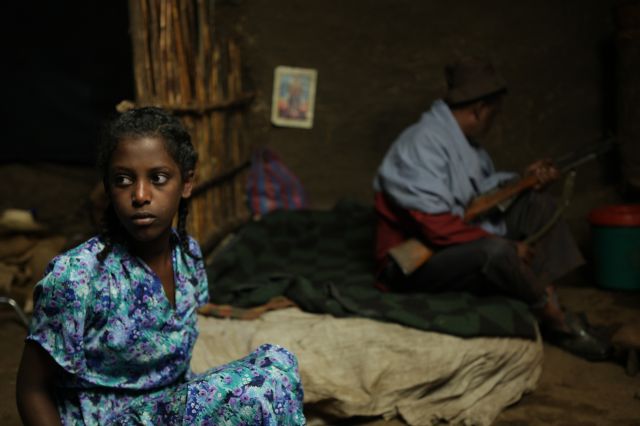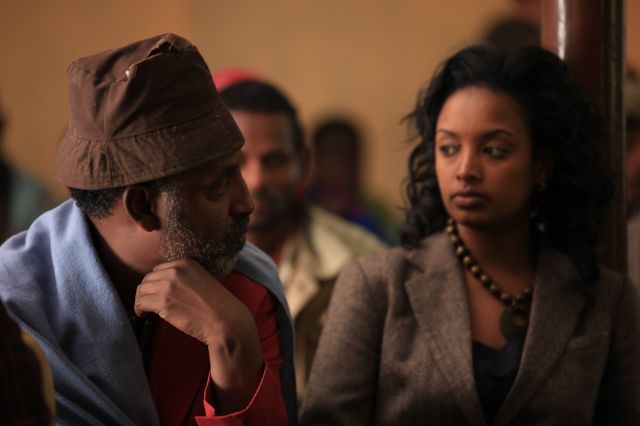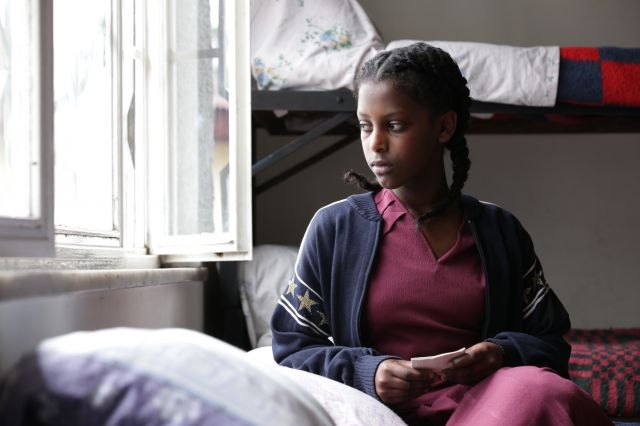Tizita Hagere as “Hirut Assefa” in DIFRET. Photo Courtesy of Truth Aid Media
Meaza Ashenafi is the human rights lawyer on who the new film Difret, executive produced by Angelina Jolie Pitt, is based. Ashenafi is the founder and Executive Director of the Ethiopian Women Lawyers Association (EWLA). She has worked with the Ethiopian Constitution Commission and has been active in legal reform efforts, public education, and information about the rights of women and girls. Today, she is involved with the African Center for Gender and Social Development of the UN’s Economic Commission for Africa and the African Women’s Rights Observatory. She also continues to provide free legal aid to women victims of injustice.
Some of the substantive policy, legal and cultural shifts in the world have been a result of women organizing and engaging in persistent advocacy for socio-political change. At the global, regional and national levels we demanded and secured the repeal of discriminatory laws against women, including those laws that sustain the prevalence of violence against women and Harmful Traditional Practices that violate the physical and mental well being of girls and women. Women called for improvement of public services in health care and education services and have made tangible progress to make such services accessible to girls and women. And more so impressive increase of the participation of women in decision making at the regional and national governance structures was achieved as a result of our tireless advocacy. For instance, the African Union (AU) is the only regional commission that has made gender parity a mandatory policy at the highest decision making positions of the entity. Together with men who support the gender equality agenda, we continue to fight for the full realization of these policy and legal commitments. I believe that, it is now time to focus our energy and mobilize global support towards the ending of entrenched harmful social norms, especially the practice of child marriage.
Child marriage has lifelong consequences on girls; it limits their potential to thrive; girls who are married too young are more likely to be poor, drop out of school, experience sexual violence or die in childbirth. That is why ending child marriage can have a positive multiplier effect on many of the issues the international community has identified as critical measures for ending global poverty. Moreover, as numerous studies have revealed investing in the well-being of girls also yields dividends for their families, communities, and society at large.
My passion for this issue comes from my first hand experience as a lawyer and an activist in Ethiopia. I was the founding director of the Ethiopian Women Lawyers Association (EWLA) which was a nonprofit women’s rights organization focused on legal reform advocacy, increasing public awareness about the human rights violations facing women and girls in the country, and helping women victims of violence and those subjected to unfair treatment in matrimonial relations receive legal aid. As chronicled in the film Difret, the efforts made to secure the freedom of a young girl who was a victim of abduction for marriage highlights the struggles and the success of EWLA. Aberash was kidnapped and raped and during her attempt to escape, she was forced to kill her would-be husband. She was then put on trial for his murder and together, with the help of others in our community, we were able to set her free. She is now taking a stand against child marriage on behalf of all young women.

Tizita Hagere (foreground) as “Hirut Assefa”. Photo Courtesy of Truth Aid Media.
When I first heard of Aberash’s story, I was inspired by her strength. Committed to supporting Aberash as well as understanding that it would be a precedent setting test case to strengthen the fight against harmful traditional practices including child abduction; I decided to mobilize my team and defend Aberash. Through our effort we were able to not only help Aberash, but went further to advocate for the reinforcement of a penalty for the crime of abduction and the repeal of a provision which made it possible for abductors who were willing to marry their victims go unpunished. Aberash’s case was a landmark case in Ethiopia, it commanded the attention of society, and helped catalyze the struggle to end child marriage. However this fight is not yet over.
Telefa, the act of abduction for marriage, remains a deeply rooted tradition and is a serious challenge in some parts of Ethiopia. Studies show that in the Southern part of our country the prevalence rate is estimated to be at 15-20 %. It is sustained by a lack of decent education, unemployment and lack of awareness, and often reinforced by social norms that limit women’s rights. With wide regional variations, studies show that in Ethiopia, two in every five girls are married before their 18th birthday and nearly one in five girls marries before the age of 15.
Whether it arranged or forced, child marriage has a major impact on childbearing because women who marry early have on average a longer period of exposure to the risk of pregnancy and give birth to a greater number of children over their life times. In addition to harming girls and women this makes it difficult to ensure full participation of women in development and equitable distribution of the development dividend. With many African countries and particularly Ethiopia’s impressive economic progress; it will be critical to pay attention to issues of gender equality without which it will be difficult to ensure sustainable and equitable growth. The legal age of marriage in Ethiopia is set at 18 under the Constitution and the Government has launched a national strategy and an Action Plan on harmful Traditional practices against women and children in 2013.

Tizita Hagere (left) as “Hirut Assefa” in DIFRET. Photo Courtesy of Truth Aid Media.
Programs will only work if they continue to have support at a local level. Externally imposed cultural and societal changes are unlikely to succeed. We need more women and men within communities practicing child marriage to stand up and stand together, embracing these new missions of ending this pernicious practice. A bold action that ought to inspire local actors and community opinion leaders is the action of a local Chief in Malawi, Chief Kachindamato, who nullified 300 child marriages in her community. The chief rightly declared “I do not want youthful marriages; they must go to school…..no child should be found loitering at home or doing household chores during school time.”
This year’s Day of the African Child, celebrated on June 16th, took on the theme of “Accelerating our Collective Efforts to End Child Marriage in Africa”. There is a growing regional momentum around this issue and we must take advantage of this opportunity. The African Union launched the Campaign to End Child Marriage in 2014, and that campaign has since been launched in several other countries in Africa. Ethiopia has committed to ending child marriage by 2025.
This momentum is being echoed in countries across the world. With the support from Truth Aid Aberash recently launched a petition in the United States calling for President Obama and the State Department to deliver a comprehensive strategy to help end child marriage globally. Following the signature of the petition by over 135,000 signatories the State Department has promised to launch the adolescent girl strategy this fall.

Mekonen Laeake as “Mr. Assefa Bekele” and Meron Getnet as “Meaza Ashenafi” in DIFRET. Photo Courtesy of Truth Aid Media
President Obama’s fourth visit to Sub Saharan Africa last month has sparked a new momentum to combat discrimination against women. In his remarks the President said ‘We can not let old traditions stand in the way. The march of history shows that we have the capacity to broaden our moral imaginations. We come to see that some traditions are good for us, they keep us grounded, but that in our modern world, other traditions set us back. When African girls are subjected to the mutilation of their bodies, or forced into marriage at the ages of 9 or 10 or 11- that set us back. That is not a good tradition. It needs to end.” The President added that ‘Nobody will put out a football team and just play half the team’.
Heads of States from 193 countries have adopted the Sustainable Development Goals (SDGs) with 17 goals that targets ending poverty and delivering sustainable development for all. Empowering women and girls requires changes from multiple dimensions including economic, social, legal, sexual and reproductive rights. For this reason, SDG 5 dealing with gender equality and empowerment of women has outlined comprehensive targets and eliminating all harmful practices, such as child and forced marriage and Female Genital Mutilation stipulated as one of the key targets.
Let’s make this the year the world stands together to end child marriage so that one day all women will have the right to choose when and whom they marry. “Difret” the title of the widely acclaimed film (scheduled to be released in the US on the 23rd of October) in the Amharic language means courage and rightfully so is a call to action.
More from BUST
How Playing Roller Derby Made Me A Better Social Media Marketer
Olga Kurylenko Goes From Bond Girl To Action Hero In New Movie ‘Momentum’: BUST Interview
Angelina Jolie Protests Sexual Violence At Global Summit


